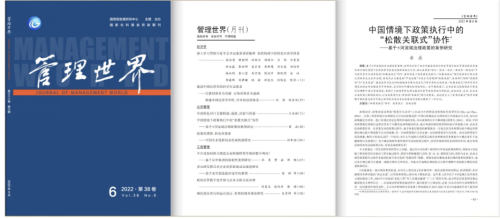Recently, Professor CUI Jing from the School of Government and Management of our school published a paper ""Loosely Relevant" Collaboration in Policy Implementation in the Chinese Context——A Case Study Based on the Governance Policy of the S River Basin" in the sixth issue of "Management World" in 2022.
 \
\
This study explores how Chinese local and grassroots governments achieve effective implementation of public policies under uncertain circumstances. Based on the case of comprehensive governance policies in the S River Basin, this study analyzes how local and grassroots governments adopt policy implementation behaviors that change at a loose pace under the uncertain situation of multiple goals and multiple policy tasks, and then in the policy "execution-modification-adaptation- In the process of "remodification-readaptation", a "loosely related" collaboration is formed with multiple actors in the policy, which ultimately leads to the effective implementation of the policy. "Loosely connected" collaboration is reflected in the "tight fit" of the formal system and the "loose connection" of informal consultations, the "principle adherence" and "flexibility" between government departments, and the procedure and expediency between the grassroots government and the public. The coexistence of contradictory forms such as calculation. As a coping mechanism for uncertainty, "loosely associated" collaboration has the functional characteristics of scalability, flexibility, and error correction. In the context of China, the effective advancement of the public policy process through constant changes and adjustments depends on the support of superior leaders and the coordination of grass-roots changes in the pace of change, as well as the consensus on public values achieved by governments, enterprises, and the public at all levels, as well as policies. "Localization" revision and integration across time, space and domain. The "loosely related" collaboration in policy implementation in the Chinese context proposed in this paper is a preliminary exploration, aiming to use "China" as a method and theory to tap the rich mine of Chinese governance. This case study explains to a certain extent the relationship and interaction process between different subjects in the process of public policy implementation in the Chinese context, and helps to tell and understand the "Chinese story" of policy implementation.
The paper published in "Management World" is an innovative exploration conducted by Professor Cui Jing on the basis of long-term case studies. Previously, Professor Cui Jing had published case study papers "Policy "Adaptive Implementation" in Grassroots Governance——Based on Case Analysis of Y District and H Town" in "Journal of Public Administration" 2022 No. 1 and 2020 No. 4 "," "Movement-style Response": Strategy Selection for Policy Implementation in Grassroots Environmental Governance——Based on a Case Study of Y Township in North China", and was awarded the 2021 Theme Case Project of the Degree and Graduate Education Development Center of the Ministry of Education.
In recent years, the School of Government and Management has been adhering to the scientific development idea of "taking root in the land of China and telling Chinese stories well", actively promoting case studies and teaching work. Iconic case study results and high-quality case teaching results emerge in endlessly, and have won awards in the China Postgraduate Public Management Case Competition many times.